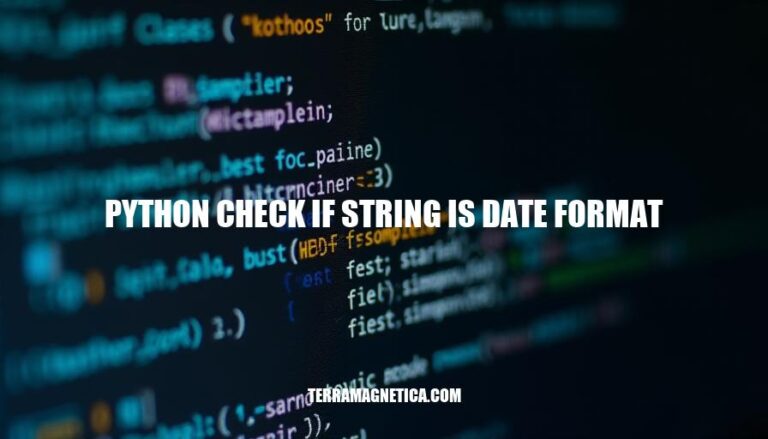


Validating date formats in Python is crucial for ensuring data integrity and preventing errors in applications. When working with dates, it’s important to verify that a string follows the expected date format. This helps avoid issues such as incorrect data processing, application crashes, and inaccurate data analysis. By using methods like strptime from the datetime module or parse from the dateutil module, developers can efficiently check if a string is in the correct date format.
To check if a string is in a date format using Python’s datetime module, you can use the strptime method. This method attempts to parse a string based on a specified format. If the string doesn’t match the format, it raises a ValueError.
Here’s how you can do it:
Import the datetime module:
from datetime import datetime
Define a function to check the date format:
def is_date_format(date_string, date_format):
try:
datetime.strptime(date_string, date_format)
return True
except ValueError:
return False
Use the function with different date strings and formats:
date_string1 = "2024-09-30"
date_format1 = "%Y-%m-%d"
print(is_date_format(date_string1, date_format1)) # Output: True
date_string2 = "30/09/2024"
date_format2 = "%d/%m/%Y"
print(is_date_format(date_string2, date_format2)) # Output: True
date_string3 = "09-30-2024"
date_format3 = "%m-%d-%Y"
print(is_date_format(date_string3, date_format3)) # Output: True
date_string4 = "2024/09/30"
date_format4 = "%Y/%m/%d"
print(is_date_format(date_string4, date_format4)) # Output: True
date_string5 = "2024-30-09"
date_format5 = "%Y-%d-%m"
print(is_date_format(date_string5, date_format5)) # Output: False
In this example, the is_date_format function checks if the date_string matches the date_format. If it does, it returns True; otherwise, it returns False.
To check if a string is in a date format using the dateutil module, you can use the parser.parse method. This method attempts to parse a string into a datetime object. If it fails, it raises a ValueError, which you can catch to determine if the string is not a valid date.
Here’s a concise example:
from dateutil import parser
def is_date(string):
try:
parser.parse(string)
return True
except ValueError:
return False
# Examples
print(is_date("2024-09-30")) # True
print(is_date("30/09/2024")) # True
print(is_date("Not a date")) # False
In this example:
parser.parse("2024-09-30") successfully parses the string as a date.parser.parse("30/09/2024") also successfully parses the string.parser.parse("Not a date") raises a ValueError, so the function returns False.Regular expressions (regex) are powerful tools for pattern matching and can be used to validate if a string follows a specific date format. Here are some examples and code snippets to illustrate this:
YYYY-MM-DD Formatimport re
# Regular expression pattern for YYYY-MM-DD
pattern = r"^(19|20)\d{2}-(0[1-9]|1[0-2])-(0[1-9]|[12]\d|3[01])$"
# Test strings
dates = ["2023-09-30", "1999-12-31", "2024-02-29", "2023-13-01"]
for date in dates:
if re.match(pattern, date):
print(f"{date} is a valid date.")
else:
print(f"{date} is not a valid date.")
DD/MM/YYYY Formatconst regex = /^(0[1-9]|[12][0-9]|3[01])\/(0[1-9]|1[0-2])\/(19|20)\d{2}$/;
// Test strings
const dates = ["30/09/2023", "31/12/1999", "29/02/2024", "01/13/2023"];
dates.forEach(date => {
if (regex.test(date)) {
console.log(`${date} is a valid date.`);
} else {
console.log(`${date} is not a valid date.`);
}
});
MM-DD-YYYY Formatimport java.util.regex.*;
public class DateValidator {
public static void main(String[] args) {
String pattern = "^(0[1-9]|1[0-2])-(0[1-9]|[12][0-9]|3[01])-(19|20)\\d{2}$";
String[] dates = {"09-30-2023", "12-31-1999", "02-29-2024", "13-01-2023"};
for (String date : dates) {
if (Pattern.matches(pattern, date)) {
System.out.println(date + " is a valid date.");
} else {
System.out.println(date + " is not a valid date.");
}
}
}
}
These examples demonstrate how to use regular expressions to validate different date formats. Adjust the regex pattern according to the specific date format you need to validate.
To handle various date formats in Python, you can use different methods to validate if a string matches a date format. Here are some common date formats and corresponding validation methods:
datetime.strptime()This method converts a string to a datetime object based on a specified format. If the string doesn’t match the format, it raises a ValueError.
Example:
from datetime import datetime
date_str = '04-01-1997'
date_format = '%d-%m-%Y'
try:
datetime.strptime(date_str, date_format)
print("Valid date format")
except ValueError:
print("Invalid date format")
dateutil.parser.parse()This method can parse a string into a datetime object without needing a specific format. It raises a ValueError if the string is not a valid date.
Example:
from dateutil import parser
date_str = '1997-04-01'
try:
parser.parse(date_str)
print("Valid date format")
except ValueError:
print("Invalid date format")
You can define a regex pattern that matches the expected date format and use the re module to check if the string matches the pattern.
Example:
import re
date_str = '04-01-1997'
pattern = r'^\d{2}-\d{2}-\d{4}$'
if re.match(pattern, date_str):
print("Valid date format")
else:
print("Invalid date format")
YYYY-MM-DD: 1997-04-01DD-MM-YYYY: 01-04-1997MM/DD/YYYY: 04/01/1997YYYY/MM/DD: 1997/04/01Each method has its use case depending on whether you need strict format validation (strptime), flexible parsing (dateutil.parser), or pattern matching (regex).
You can use three main methods to validate if a string matches a date format: `datetime.strptime()`, `dateutil.parser.parse()`, and regular expressions (regex). Each method has its strengths and weaknesses, making it essential to choose the right one based on your specific use case.
`datetime.strptime()` is suitable for strict format validation. It converts a string to a `datetime` object based on a specified format, raising a `ValueError` if the string doesn’t match the format. This method is ideal when you need to ensure that the input date string conforms to a specific format.
`dateutil.parser.parse()`, on the other hand, provides flexible parsing capabilities. It can parse a string into a `datetime` object without requiring a specific format, raising a `ValueError` if the string is not a valid date. This method is useful when you need to handle various date formats or when the input date string may be in different formats.
Regular expressions (regex) offer another approach for validating date strings. You can define a regex pattern that matches the expected date format and use the `re` module to check if the string matches the pattern. This method is suitable when you need to perform pattern matching or when the date format is not fixed.
When choosing a method, consider the following factors:
Ultimately, selecting the right method depends on your specific use case and requirements. By understanding the strengths and weaknesses of each approach, you can make an informed decision and ensure that your code accurately validates date strings in Python.